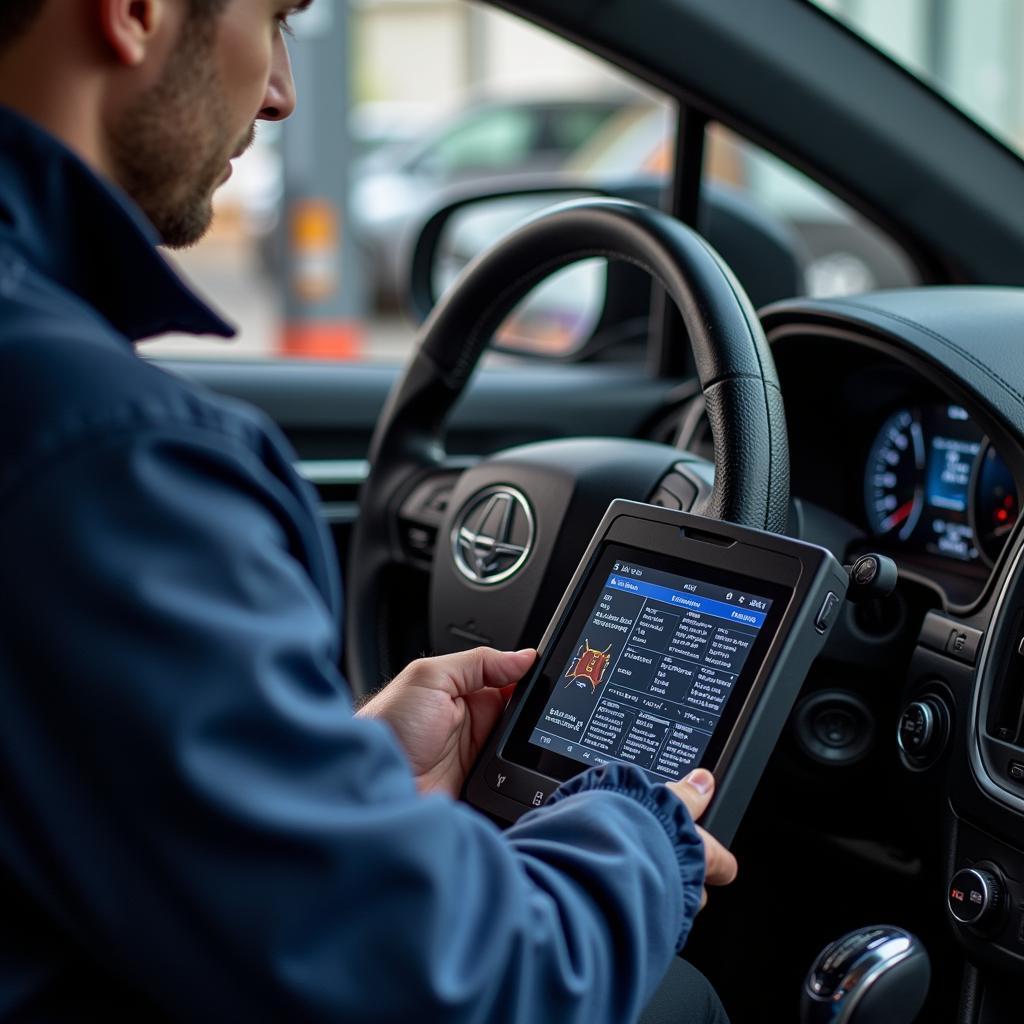What Do I Need to Fully Service My Car?
Keeping your car running smoothly means staying on top of regular maintenance. But what does a “full service” actually entail? Whether you’re a DIY enthusiast or prefer a professional touch, understanding what goes into a complete car service can save you money and headaches down the road.
This guide breaks down the essential checks and services that make up a comprehensive car service.
The Importance of Regular Car Servicing
Think of your car like an athlete; regular training (maintenance) keeps it performing at its peak. Regular servicing not only keeps your car running smoothly but also:
- Increases safety: Well-maintained vehicles are less likely to break down or experience malfunctions that could lead to accidents.
- Improves fuel efficiency: A well-tuned engine burns fuel more efficiently, saving you money at the pump.
- Extends lifespan: Regular servicing catches minor issues before they become major problems, extending the life of your vehicle.
- Maintains value: A well-documented service history can increase your car’s resale value.
What a Full Car Service Includes
A full car service is more than just an oil change. It’s a comprehensive inspection and maintenance session that covers all the crucial areas of your vehicle. Here’s a closer look at what’s usually included:
1. Engine Oil and Filter Change
This is the cornerstone of any car service. Engine oil lubricates moving parts, reduces friction, and helps cool the engine. Over time, oil degrades and loses its effectiveness.
2. Fluid Level Checks and Top-ups
Your car relies on various fluids to function correctly. A full service includes checking and topping up fluids like:
- Coolant
- Brake fluid
- Power steering fluid
- Transmission fluid
- Windshield washer fluid
3. Air Filter Replacement
The air filter prevents dirt and debris from entering the engine. A clogged air filter restricts airflow, reducing engine performance and fuel efficiency.
4. Spark Plug Inspection/Replacement
Spark plugs ignite the air-fuel mixture in the engine cylinders. Worn-out spark plugs can cause misfires, reduced power, and decreased fuel economy.
5. Battery Test
Your car battery provides the initial power to start the engine. A battery test checks the battery’s voltage and cold-cranking amps to ensure it’s in good working order.
6. Tire Inspection and Rotation
Tires are your car’s only contact with the road. A full service includes checking tire pressure, tread depth, and overall condition. Tires are also rotated to ensure even wear and tear.
7. Brake Inspection
Brakes are critical for safety. A mechanic will inspect the brake pads, rotors, calipers, and brake lines for wear and tear and ensure the braking system functions correctly.
8. Steering and Suspension Check
The steering and suspension system keeps your car handling smoothly and safely. A mechanic will check for any play in the steering wheel, inspect suspension components, and ensure proper alignment.
9. Lights and Electrical Check
All exterior and interior lights are checked to ensure they are working correctly. The mechanic will also check the vehicle’s electrical system, including the alternator and starter motor.
10. Diagnostic Scan
Modern cars are equipped with onboard computers (ECUs) that monitor various systems. A diagnostic scan can detect stored error codes, providing valuable insights into potential issues.
 Mechanic performing a diagnostic scan on a car
Mechanic performing a diagnostic scan on a car
Service Intervals
The frequency of car servicing depends on various factors, including your car’s make and model, driving conditions, and manufacturer recommendations. However, a general guideline is to have your car serviced:
- Every 6 months or 5,000-7,500 miles: For standard oil changes and basic inspections.
- Every 12 months or 10,000-15,000 miles: For a more comprehensive service, including fluid top-ups, filter replacements, and inspections.
- Every 24 months or 30,000 miles: For a major service, which includes all the elements of a full service plus more in-depth inspections and potential component replacements.
DIY vs. Professional Car Service
While some routine maintenance tasks, like checking fluid levels or changing the air filter, can be done at home by experienced individuals, others require specialized tools, knowledge, and safety precautions. Here’s a quick comparison:
DIY:
- Pros: Potentially save money on labor costs.
- Cons: Requires tools, knowledge, time, and can void warranties if done incorrectly.
Professional:
- Pros: Expertise, specialized tools, peace of mind, and maintains warranty.
- Cons: Can be more expensive.
Ultimately, the best approach depends on your comfort level, budget, and the complexity of the service required.
Conclusion
Regular car servicing is not an optional expense; it’s an investment in your vehicle’s performance, safety, and longevity. Understanding the key components of a full car service empowers you to make informed decisions about your car’s maintenance. Whether you choose to DIY some tasks or rely on the expertise of a professional mechanic, make sure your car receives the regular care it needs to keep you safe and on the road for miles to come.
FAQs
1. How much does a full car service cost?
The cost varies depending on your car’s make and model, location, and the specific services included.
2. Can I service my own car?
While some tasks can be done at home, others require specialized tools and knowledge. It’s crucial to consult your owner’s manual and proceed with caution if attempting DIY maintenance.
3. What happens if I skip car services?
Skipping services can lead to reduced performance, decreased fuel efficiency, increased wear and tear, and potential breakdowns, ultimately costing you more in the long run.
4. How do I choose a reputable car service provider?
Look for ASE-certified mechanics, ask for recommendations, read online reviews, and compare prices before making a decision.
5. What is the difference between a full service and a major service?
A major service is more comprehensive and includes additional inspections and potential component replacements compared to a full service.
Need help diagnosing a car problem? Check out these resources:
- Can I drive my car if it says service stabilitrak?
- How to service a dead car battery
- What to do when servicing your own car
Still have questions?
We’re here to help! Contact our team of car experts 24/7 via WhatsApp: +1(641)206-8880, Email: [email protected].

